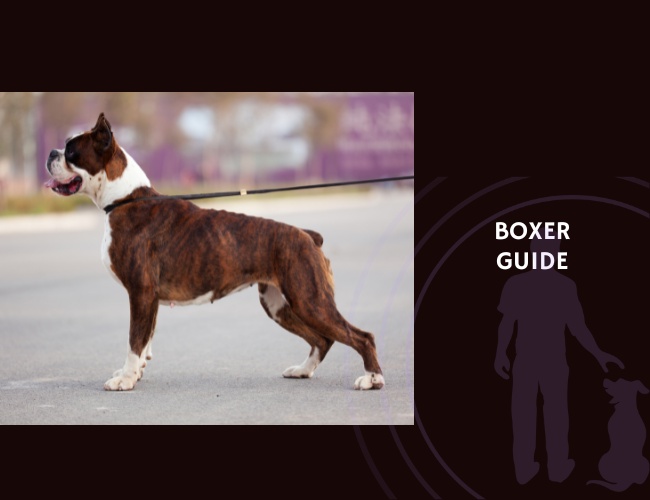Introduction to the Boxer Breed
The Boxer’s Origin and Working Heritage
The Boxer’s story starts in nineteenth-century Germany. This breed was originally developed by crossing the sturdy Bullenbeisser with other breeds, such as English Bulldogs. The goal was to create a strong, agile, and versatile working dog. Boxers quickly showed their skills in guarding, herding cattle, and even catching game, thanks to their intelligence and bold spirit. Over time, their friendly yet determined character made them beloved family dogs all over the world.
Unmistakable Physical Features
Boxers are true head-turners 🐾. A medium-sized build hides impressive muscle beneath a sleek, short coat. You’ll notice a broad, well-proportioned head, often paired with a short, square muzzle. Their eyes are dark and full of expression, hinting at their lively personalities. The breed’s jaw is strong and slightly undershot, which gave them an advantage in gripping tasks. And, of course, their animated face—complete with a mischievous, wrinkled brow—is simply unforgettable.
Their bodies are athletic, built for action but never bulky. Tails are generally docked (though this is changing), and their movement is energetic and springy. Coats come in shades of fawn, brindle, or with white markings, always smooth and close to the skin. Boxers stand out wherever they go, thanks to their balanced shape and confident stance.
Temperament: What Sets Boxers Apart
Boxers have a reputation for being both fun-loving and deeply loyal. Their energy level is high, so they thrive when given jobs or activities that stimulate body and mind. They’re known to be “puppies for life,” bounding into play at any age, yet are fully aware of their family’s moods and needs.
What makes a Boxer so unique as a companion? It’s their blend of confidence and sensitivity. They form strong connections with people and are always eager for affection. You’ll find them following family members around the house or nudging a hand for a pet. Despite their powerful appearance, Boxers are gentle with children and are generally patient playmates.
Their origins as working dogs mean they are alert and protective, yet not aggressive without reason. With proper socialization, they can get along well with other dogs and are often welcoming to visitors—unless their home feels threatened.
These qualities create a dog who is spirited, expressive, and endlessly devoted. Boxers remind us daily that true strength can live side by side with warmth and joy.
Up next, we’ll explore the character and behavioral traits that set Boxers apart from other breeds.
Character & Behavior of Boxers
Confident and Expressive by Nature
Boxers are like a bright spotlight in the dog world—always in the center of things and eager to show their playful side. Their working heritage shows up in their confident attitude. You’ll notice this right away in the way they carry themselves—proud, alert, and ready for any fun that comes their way. Their broad faces are very expressive, and their “wiggle butt” greetings can bring a smile to anyone’s face.
These dogs are not shy. In fact, Boxers tend to be outgoing and assertive. They thrive when they can show off their energy and strength through play. Whether it’s chasing after a ball or trying to solve a simple puzzle toy, they love to be challenged and involved. Confidence, not aggression, defines a well-bred Boxer.
Building Strong Human Connections
There’s a reason Boxers have a reputation as loyal family dogs—they create deep, lasting bonds with their people. These dogs don’t just like to be around you—they need it. Boxers love cuddles, attention, and even just being close by while their humans go about daily routines.
Boxers show emotional sensitivity in surprising ways. If you are having a rough day, your Boxer will likely pick up on it and try to comfort you. This strong connection means they often become anxiety-prone when separated. Because of this, being left alone for long periods isn’t a good match for their well-being. A Boxer craves involvement and will blossom when treated as a true companion rather than just a pet.
Boxer Playfulness and Social Behavior
With other dogs, Boxers are generally friendly, but they need early and positive socialization to ensure healthy behavior. It’s not unusual for a young Boxer to be a little too excitable during play, especially with unfamiliar pups. Teaching impulse control and guiding them through structured playgroups can make a big difference. Early training helps them manage their enthusiastic greetings and keeps interaction safe for dogs and people alike.
Keep in mind that boredom can bring out unwanted behaviors—like jumping, barking, or extra mouthiness—so routine mental and physical activities are a must for keeping Boxers happy.
Fostering a Boxer’s best qualities means giving them opportunities to be active, social, and loved…which sets the foundation for all the training and life experiences to come.
Training Your Boxer
Positive Reinforcement: The Key to Success
When it comes to training Boxers, gentle and consistent positive reinforcement is your best friend. These dogs are known for their emotional sensitivity and thrive on encouragement. Reward-based methods, like treats, toys, or praise, help Boxers understand what you expect without fear or stress. Harsh corrections, on the other hand, can make your Boxer shut down or become stubborn. Their desire to please shines brightest when met with supportive and professional training that feels fun for both of you.
Here are some positive reinforcement tips:
- Reward good behavior immediately—timing matters!
- Keep sessions short and upbeat.
- Use treats they love, or a favorite toy, as motivation.
- End sessions on a high note for lasting confidence.
A friendly, informative approach reassures Boxers and builds a strong bond with their humans.
Early Priorities: Impulse Control and Socialization
Boxers are bouncy and excitable by nature. Early training should focus on impulse control, teaching young Boxers how to pause and listen before leaping into action. Start simple with cues like “sit,” “wait,” or “leave it.” Patience pays off, as over time your Boxer learns polite greetings and calm responses to distractions.
Socialization is equally crucial. Introduce your Boxer early to:
- Different people
- New environments
- Other dogs
This structured exposure helps reduce fear and teaches your Boxer how to interact safely and politely with the world around them. Remember, every positive new experience is a building block toward a balanced dog.

Meeting Mental and Physical Needs
Boxers love a challenge! Routine mental workouts are key to preventing boredom, which can lead to unwanted behaviors like jumping or barking. Rotate training games, puzzles, or scent work to keep your Boxer’s brain engaged.
Suitable activities for Boxers include:
- Obedience games that encourage focus
- Agility courses for balance and speed
- Protection work, which channels their drive into positive habits
- Trick training—because who doesn’t love a clever Boxer showing off?
Every activity supports your Boxer’s confidence and strengthens your teamwork.
With patience, positivity, and a little creativity, training your Boxer becomes a rewarding journey. This partnership sets the stage for a healthy, happy life together.
Nutritional Requirements
A Boxer is not just a bundle of energy and expressive personality—what you feed truly matters to their health and happiness. Let’s break down how to nourish your Boxer Nutrition for peak condition and well-being.
Fueling an Active Lifestyle
Boxers are high-energy dogs that need plenty of fuel. Their caloric intake should match their activity. If your Boxer enjoys daily exercise, their diet should provide enough energy to keep them strong without unwanted weight gain. Too many calories can lead to obesity, which can be tough on their joints and heart. Monitoring treats and portion sizes ensures a healthy balance for your bouncy friend.
- Active Boxers need a moderate to high daily calorie count
- Regular activity means more food is needed, but balance is key
- Watch out for weight gain—it can make existing health problems worse
Building Strong Muscles and Joints
Protein is the cornerstone of any Boxer’s diet. These dogs are naturally muscular and need quality protein to maintain that strength. Foods with 25–30% protein from animal sources support lean muscle and keep them active as they play, train, or guard their family. In addition, Boxers benefit from nutrients that protect their joints, especially if they are involved in high-impact activities.
- Seek dog food with 25-30% animal protein
- Glucosamine and chondroitin are beneficial for joint health
- Proper muscle support keeps Boxers running, jumping, and playing happily
Managing Sensitivities and Preventing Bloat
Boxers can have sensitive stomachs. Some may react poorly to grains or common fillers. If you notice your Boxer having tummy troubles, a limited-ingredient or hydrolyzed protein diet might offer relief. Their short, broad muzzles (brachycephalic heads) can also make some bowls or kibble sizes tricky—look for dog bowls designed to make eating easier for them.
One vital risk to watch for is bloat (gastric dilatation-volvulus)—a life-threatening condition. To minimize this danger:
- Feed several smaller meals instead of one large meal
- Avoid vigorous exercise right before or after meals
- Use slow-feeder bowls if your Boxer eats rapidly
Caring for a Boxer means keeping a close eye on what goes in their bowl. A protein-rich, balanced diet not only meets their energetic needs but also supports their long-term wellbeing.
Next, we’ll focus on health issues and how to proactively manage them for a Boxer’s happiest, healthiest life.
Bold. Bouncy. Bonded.
Always in the spotlight.
Boxers carry themselves like they own the room—confident, animated, and full of wiggle-butt joy.
Muscle meets heart.
Behind the powerful frame is a sensitive soul that craves connection. They’re not just pets—they’re your shadow.



Built for love. Built for life.
With the right structure, routine, and care, a Boxer will give you a decade of laughs, loyalty, and unforgettable play.
Health Concerns & Common Diseases
Boxers are active, loving dogs, but their breed comes with some important health risks that every owner should know. Taking steps to support their health can help your Boxer live a happy, energetic life.
Heart Conditions
One of the most serious health risks for Boxers is heart disease. Two main heart issues are especially common:
- Arrhythmogenic right ventricular cardiomyopathy (ARVC): This inherited condition affects the heart muscle, causing irregular heartbeats and sometimes fainting or even sudden death. Early signs can be hard to spot, making regular cardiac screening by a vet absolutely vital.
- Subaortic stenosis (SAS): Here, a narrowing below the heart’s aortic valve causes the heart to work harder. Over time, this can lead to heart failure. Puppies can be screened for SAS, and adult monitoring is recommended to catch problems early.
Because heart issues are so common, routine veterinary checkups with cardiac evaluations are strongly advised for Boxers throughout their lives.
Cancer Risk
Sadly, cancer is a leading cause of death in Boxers. Mast cell tumors and other kinds of cancer, like lymphoma, can show up at any age. What’s tricky is that these cancers often appear as lumps under the skin or inside the body, so regular checkups are the best way to catch them early. If you notice any unusual swelling, changes in appetite, or unexplained weight loss, talk with your vet quickly. Early diagnosis can make treatment much more successful.
Breathing & Structural Health
Some Boxers have a short muzzle, known as brachycephalic structure. This can make breathing harder, especially in hot or humid weather. These dogs may snore, have noisy breathing, or get tired quickly when overheated. Avoid vigorous exercise in the heat and always provide plenty of water and a cool place to rest. Brachycephalic airway syndrome can also make some Boxers more sensitive to anesthesia during surgery.
Other Health Issues
There are a few other problems to watch for:
- Hip dysplasia (joint issues making movement painful)
- Hypothyroidism (low thyroid hormone)
- Degenerative myelopathy (spinal cord disease)
Proactive, supportive care and regular veterinary screening can go a long way in helping your Boxer stay healthy.
With this foundation of care, you’ll be ready to create a happy, safe environment where your Boxer can thrive—inside and out.
Creating the Ideal Living Environment
Fulfilling Exercise Needs
Boxers are energetic dogs that thrive on daily activity and mental engagement. To keep your Boxer happy and healthy, plan for at least 60–90 minutes of structured exercise each day. This means more than just a quick walk around the block. Great activities include:
- Brisk walks or jogs
- Play sessions in a secure yard
- Agility exercises or fetch games
- Puzzle toys or basic obedience training
These activities help manage your Boxer’s energy and prevent boredom, which can lead to unwanted behaviors. Boxers do best when exercise is a fun part of your routine—not an afterthought.

Encouraging Social Interaction
Boxers are social butterflies who crave attention from their family. They want to be included in daily routines, whether that’s lounging next to you on the couch or joining you for errands. Without regular contact, they may become anxious or develop troublesome habits like chewing or barking excessively.
To support their emotional health:
- Involve your Boxer in family activities.
- Offer gentle affection, playtime, and short training sessions throughout the day.
- Provide interactive toys and chew treats if you leave for a few hours.
Preventing Separation Anxiety
This breed is sensitive and doesn’t tolerate being left alone for long. Boxers may develop separation anxiety if isolated often. Signs include destructive chewing, digging, or howling. Prevent this by:
- Setting a consistent daily schedule for walks and meals.
- Gradually increasing the time your Boxer spends alone, starting with short intervals.
- Using puzzle feeders or safe comfort items during short absences.
- Arranging for dog walkers or pet sitters if you must be away for extended periods.
Maintaining a Stable Household
A calm, predictable environment is key for your Boxer’s well-being. Dogs feel safest when life follows a regular rhythm. Set routines for meals, walks, and bedtime. Limit sudden changes to your schedule. Moderate sensory stimulation—a balance between gentle noises, activity, and downtime—helps prevent overwhelm and emotional stress.
Remember, your Boxer’s stability is built on your care, attention, and thoughtful planning. Creating this supportive environment helps your dog blossom as a loving companion, making every day rewarding for both of you.
Boxer Lifespan & Long-term Care
Lifespan Expectations and Influencing Factors
Boxers are known for their energy and zest for life, but like all breeds, their time with us is finite. Most Boxers live between nine and twelve years. Their lifespan can be influenced by genetics, overall care, diet, and sometimes a bit of luck. Certain health conditions—especially heart disease and cancer—are sadly common in the breed and can impact longevity. Regular attention to these risks helps many Boxers reach the higher end of their life expectancy.
Preventative Healthcare Roadmap
Staying ahead of health problems is one of the most supportive choices you can make for your Boxer. Here’s what you should keep in mind:
- Routine wellness exams: Dogs benefit from annual or bi-annual veterinary check-ups. Your vet will watch for signs of heart issues (like arrhythmogenic right ventricular cardiomyopathy and subaortic stenosis), as well as early signs of cancer, hip dysplasia, and thyroid issues.
- Vaccinations and parasite control: Keep vaccinations up-to-date and maintain a regular schedule for flea, tick, and worm prevention.
- Specialized screening: Boxers do best when checked regularly for breed-specific conditions—especially heart-related disorders and mast cell tumors.
- Weight management: Maintaining a healthy weight reduces strain on joints and supports heart health.
A professional, informative approach to regular care is key for any long-lived Boxer.
Aging and Senior Boxer Care
As your Boxer ages, their needs change, and it’s important to adapt to support their comfort and health.
- Diet: Modify meals to match lower energy levels and address any sensitivities. Senior diets usually include joint-protecting supplements.
- Exercise: Seniors still need activity but may switch to gentler, shorter walks or play. Watch for stiffness or slowing down.
- Routine: Predictable daily routines and a stable home environment help aging Boxers stay emotionally balanced and reduce anxiety.
- Home modifications: Soft bedding and easy access to favorite resting spots make a big difference.
Keep in mind that regular, supportive interactions and a little extra compassion make the golden years shine for your furry friend.
Staying proactive about healthcare and attuned to your Boxer’s changing needs leads to a happy, healthy relationship—where every year is a good one.
Is a Boxer Right for You?
Choosing to welcome a Boxer into your family is a big decision. While their playful spirit and affectionate nature make them unforgettable companions, Boxers also have unique needs. Let’s walk through what you should consider before making this lively breed a part of your daily life.
Lifestyle Compatibility
Boxers are bursting with energy, enthusiasm, and a need for interaction. They thrive best in homes where daily activities and exercise are part of the routine. Expect to dedicate at least 60–90 minutes each day to structured physical activity, like long walks, runs, or playing fetch in a secure area. If you work long hours or travel often, a Boxer may struggle with your absence, since they have a low tolerance for being alone. Their emotional sensitivity and need for close human contact mean they do best in homes where someone is usually around to offer company and support.
Living Space and Family Dynamics
You don’t need a sprawling house, but enough space for movement and play is important. Apartments can work if daily outdoor time is prioritized! Boxers are family dogs at heart and usually get along well with children, thanks to their gentle yet silly personalities. Early socialization ensures they’re polite with pets and guests. If you have young kids, teach both children and your Boxer how to interact respectfully for everyone’s safety and fun.
Boxers bond closely with their family, making them great for people seeking a loyal companion. However, this strong attachment can lead to separation anxiety if they are often left alone. They are best suited to families or individuals who appreciate being followed from room to room and enjoy an intelligent, expressive dog as a daily friend.
Financial Commitment
Owning a Boxer goes beyond just love and playtime. Their health requires consistent investment. Routine vet visits, high-quality food, and preventive care add up. Be sure to factor in costs for:
- Annual veterinary check-ups
- Nutrition suited to high-energy and sometimes sensitive stomachs
- Pet insurance (especially given their predisposition to certain illnesses)
- Toys, training classes, and possible emergency health care
Because Boxers are prone to heart issues, cancers, and joint concerns, budgeting for regular medical checkups and treatments is a must to keep them healthy and happy.
Taking these factors into account helps you decide if the Boxer’s high-spirited loyalty and energy align with your own lifestyle.










